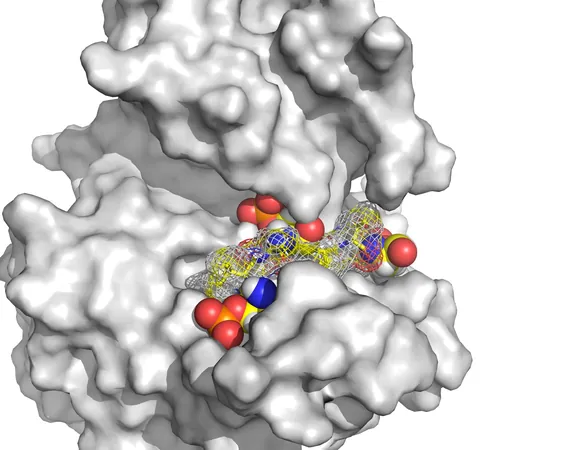
Say Goodbye to Jet Lag: Scientists Uncover Body Clock's Hidden Secrets!
2024-10-07
Author: Ying
Groundbreaking Discovery on Jet Lag
In a groundbreaking discovery, scientists have identified a potential key to permanently conquering jet lag by unlocking the enigmatic functions of a protein known as Casein Kinase 1 delta (CK1δ), which is crucial in regulating our body clock. This recent advancement, led by researchers from Duke-NUS Medical School and the University of California, Santa Cruz, heralds a new frontier in our understanding of circadian rhythms—the innate 24-hour cycles that govern our sleep-wake patterns and broader daily activities.
Their remarkable findings, published in the esteemed journal *Proceedings of the National Academy of Sciences (PNAS)*, could revolutionize treatments for various disorders associated with disruptions in our body clock.
CK1δ and Its Role
CK1δ is essential in moderating circadian rhythms by tagging other proteins integral to our biological clock, fine-tuning the precise timing of these rhythms. Intriguingly, CK1δ can also tag itself, essentially modifying its own regulatory capacities regarding the proteins that orchestrate the internal clock of our bodies.
Isoforms of CK1δ
Previous studies have established the presence of two unique isoforms of CK1δ—designated as isoform α1 and α2—differing by just 16 amino acids at the C-terminal tail. Despite this minor variation, these changes significantly influence CK1δ’s functionality. While it was understood that the tagging of these proteins diminishes their regulatory capabilities, the mechanisms behind this phenomenon remained elusive—until now.
Utilizing cutting-edge spectroscopy and spectrometry techniques, the research team zeroed in on the C-terminal tails of the proteins, discovering how tagging is determined by their distinct sequences.
Insights from the Researchers
Professor Carrie Partch, a leading investigator at the University of California, Santa Cruz, elaborated on the findings: “We've pinpointed three specific phosphorylation sites on CK1δ's tail essential for regulating the protein's activity. When tagged with a phosphate group, CK1δ loses its efficiency in influencing our circadian rhythms. This high-resolution analysis has illuminated critical sites in the protein, which is incredibly exciting!”
After studying CK1δ for over three decades, Professor David Virshup, director of the Cancer and Stem Cell Biology Program at Duke-NUS, expressed satisfaction in solving a longstanding mystery. “Our technology has finally clarified questions that have lingered for over 25 years. Our research indicates that the α1 tail interacts more intensely with the main section of the protein, leading to heightened self-regulation compared to α2. This means that while alterations to α1's tail can boost its activity—thereby affecting circadian rhythms—α2 lacks the same regulatory nuances.”
Broader Implications
This new understanding underscores the striking influence a mere segment of CK1δ can exert over its overall activity. Such self-regulation is key for maintaining CK1δ's activity balance, which in turn supports our circadian rhythms.
Moreover, the implications of this research extend beyond merely decoding jet lag. CK1δ is involved in critical processes such as cell division, cancer progression, and certain neurodegenerative diseases. By gaining deeper insights into CK1δ’s regulatory mechanisms, researchers could potentially unveil new treatment strategies for not only circadian rhythm disorders but also a variety of health issues.
Future Research Directions
Professor Patrick Tan, Senior Vice-Dean for Research at Duke-NUS, highlighted the broader significance of this discovery. “Regulating our internal clock transcends simply alleviating jet lag. It holds the promise of enhancing sleep quality, metabolism, and overall well-being. This significant finding could unlock new therapeutic avenues that fundamentally reshape how we manage essential life aspects.”
The research team intends to delve deeper into how everyday factors—including diet and environmental shifts—affect the predictive tagging sites on CK1δ. This exploration may illuminate how external elements influence circadian rhythms and lead to actionable solutions for mitigating disruptions in our daily lives. Get ready to reclaim your schedule and bid farewell to the woes of jet lag!


 Brasil (PT)
Brasil (PT)
 Canada (EN)
Canada (EN)
 Chile (ES)
Chile (ES)
 España (ES)
España (ES)
 France (FR)
France (FR)
 Hong Kong (EN)
Hong Kong (EN)
 Italia (IT)
Italia (IT)
 日本 (JA)
日本 (JA)
 Magyarország (HU)
Magyarország (HU)
 Norge (NO)
Norge (NO)
 Polska (PL)
Polska (PL)
 Schweiz (DE)
Schweiz (DE)
 Singapore (EN)
Singapore (EN)
 Sverige (SV)
Sverige (SV)
 Suomi (FI)
Suomi (FI)
 Türkiye (TR)
Türkiye (TR)